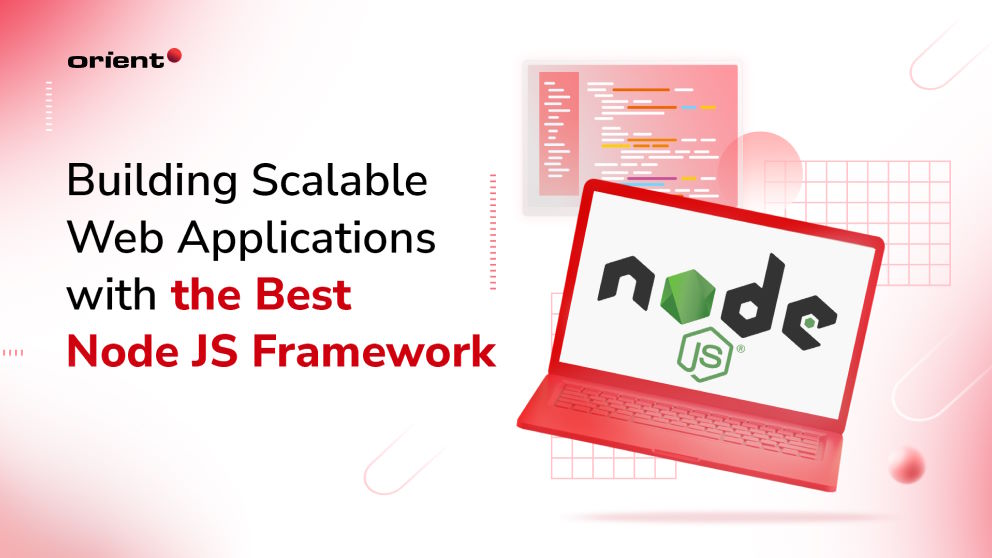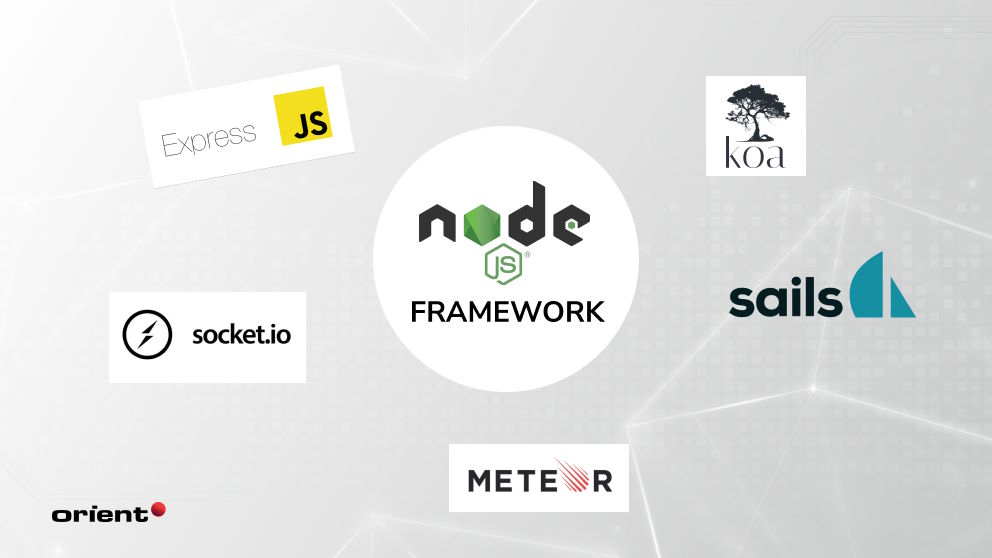Building Scalable Web Applications with the Best Node JS Framework

Content Map
More chaptersFor many, modern web applications are preferred due to their low maintenance, easily customizable nature, and convenient accessibility from web browsers. The rise in popularity of web apps has put developers on the quest to look for tools that make web app development processes more efficient and convenient. Development frameworks meet this need very well. They are, however, typically used for frontend development, but backend development processes can benefit from using them as well.
This is where Node JS comes into the picture. Node JS frameworks provide web developers with various frameworks, libraries, and templates to create web applications. It is in charge of the data storage and the server-side business logic.
Around 3% of websites globally use Node JS, which approximates around 30 million websites. Being such a popular development tool, Node JS can be challenging to select a Node JS framework that fits your development needs. Therefore, we have compiled a list of the best Node JS frameworks, discussed their features, and how they equip you with the right tools to handle specific problems.
A Quick Overview of The Node JS Framework

Definition
What is a Node JS framework?
Node.js is a powerful programming language that is used by web developers to create software applications. It is the foundation on which various software applications are built. Node.js libraries and tools are essential for the development of any software application.
Node.js frameworks are a collection of frameworks that extend the features and functionalities of Node. They allow web developers to use JavaScript for not only the front end of an application but also the backend development of the application.
Is Node JS Considered a Framework?
Whether Node JS is a framework or not has been an ongoing debate for the longest time. In many cases, Node JS is considered a framework.
However, Node.JS is actually a runtime that is built atop a programming language, in this case JavaScript, and supports the execution of frameworks. In other words, Node.js is not a language, nor is it a framework; rather, it is a runtime environment for frameworks.
Conversely, functions are created using frameworks. To provide Node.js programs with unique features, developers have developed frameworks for the language, such as Express.js and Meteor.js. Software engineers may create web apps with Node.js more efficiently thanks to these Node.JS frameworks.
Types of Node JS Frameworks
There are three types of Node JS frameworks:
- MVC Frameworks
- Full-Stack MVC Frameworks
- REST API (Representational State Transfer) Frameworks
What Makes a Great Node JS Framework?

It usually takes time and experience to determine the right Node framework for a particular project. However, there are general desirable features that you should look for in a Node JS framework.
Scalability
An efficient and scalable Node framework does not limit the ways one executes a project. After all, the framework determines the product’s functionalities, error handling, and data processing.
Another crucial thing to be on the lookout for is the ability to reuse codes and utilize a variety of Node libraries and packages. An active community and comprehensive documents that are used across numerous industries will help you move forward quickly in your project.
Functionality
Popular Node JS frameworks, libraries, tools, and IDEs are preferred by 42.73% of professional developers for app development. Still, the ideal functions of a Node JS web application framework depend on each project. The following are generally desirable functions most developers look for:
- Declarative Programming Support: A good Node JS framework should allow developers to express the desired result of a program instead of describing the steps needed to get there. This method makes it easier to structure and scale the code, which leads to better code quality and modularity.
- Cluster Management Support: A framework that supports cluster management is ideal as it allows you to organize, preview, edit, and manage clusters. You can also sort them by their properties, which makes it easier to manage and optimize your application.
- Middleware Support: Middleware is software that aids developers in improving their application’s performance and security. A good framework should allow the integration of middleware to optimize the application’s functionality and provide a better experience to the users.
- Batch Support: A framework that supports batch processing is desirable as it allows you to handle multiple background processes at the same time. It should allow you to access the same databases or API caches, even if they’re currently running, which makes it easier to accomplish many tasks at once.
The Best Node.JS Frameworks
For your convenience, we have done the research and created a list of the most popular Node.JS frameworks. For each framework, we will discuss its key features, when to use them, and some of their advantages and disadvantages.

Express.js
With a robust feature set for both web and mobile applications, Express is a minimal and flexible Node.js web application framework. It is also the most famous Node.JS framework.
Companies That Use Express.Js
X (Twitter), Accenture, Uber, Fox Sports
Key Features
- Using asynchronous programming to handle multiple operations independently
- Extensive test coverage, HTTP helpers, and better content negotiation to enable improved communication between the client and server
- Uses the MVC architectural pattern, which allows developers to break down larger applications into smaller parts for easier handling
- Provides over 14 engine templates, HTTP methods, and synchronization to enhance its performance
- A debugging function that helps developers identify and fix problems quickly
- Developers can integrate important functionalities in their projects using middleware
When to Use Express.Js
- Ideal for web and mobile app development, regardless of size
- Enterprise-level web apps
- Browser-based apps
- Building backend services like web APIs and web sockets
- A great choice for beginner teams
Advantages
- No steep learning curve is needed; you only need a basic understanding of the Node.JS environment and programming skills
- Improved communication between client and server
- Express.JS offers a powerful routing system that allows developers to handle different HTTP requests for different URLs
- Minimal and lightweight
- Express.js supports middleware for logging, authentication, and error handling, with built-in and custom options
Disadvantages
- Lack of structure and convention can lead to messy and hard-to-maintain code
- Overhead can be a concern for applications that require extremely high performance
- Limited built-in features
- Strong typing and compile-time checks are particularly important for larger applications with many dependencies and complex logic
- Security isn’t strong enough
Meteor.js
Meteor is a full-stack JavaScript framework designed for creating contemporary mobile and online applications.
Companies That Use Meteor.Js
Deloitte, Mazda, Forage, Qualcomm
Key Features
- Full-stack JavaScript framework
- Coding in modern JavaScript, Isomorphic framework
- Ability to work with other JavaScript frameworks (Mango, Vue, React)
- Quick prototyping with CLI (Command Line Interface)
- Pre-configured login and account packages spare developers from having to create their authentication frameworks
- With a few instructions, you can use Meteor’s Cordova integration to run your current app on an iOS or Android device
When to Use Meteor.Js
- Your team is already familiar with Javascript
- You want to build a mobile application
- Install updates in the live app
Advantages
- Real-time communication: developers see changes in real time when developing and scaling the app
- Benefiting frontend developers since Meteor.js integrates with React.js, Vue.js, Angular, etc.
- It supports cross-platform web development, which means you can use your app on Android, iOS, desktop computers, and so on
- The Meteor community is huge and active and always ready to support anyone who needs help
- Small codebase and the ability to reuse codebase for the mobile environment.
- You can use the same code for building web applications and mobile applications
Disadvantages
- Limited database support
- Lack of testing frameworks
- No default server-side rendering
- Scalability is limited
Koa.js
Koa.js is a lightweight and extensible Node.js web application framework. It is an open-source framework created by the developers of Express.js.
Companies That Use Koa.Js
Attio, Loveholidays, PathMotion.
Key Features
- The core of Koa.js middleware is delivered as a bundle. Server-side programming is simpler and faster as a result
- Easier upstream and downstream controls create simplified synchronized programming
- Clear cache, facilitate content negotiation and proxy
- More customization options, allowing developers to build apps from the ground up
When to Use Koa.Js
- Performance is a crucial metric
- There is a large and experienced development team working on a big project
- You want to get rid of callbacks
- A faster development process is desired
Advantages
- Many Express.JS libraries and packages are translated to Koa.Js.
- Doesn’t use callbacks
- Lightweight and flexible since there are no built-in middleware
- Easy and smart error management, Koa.Js makes it easy to find errors when developing apps
- With its component-based building blocks, the Koa generator makes it simple for developers to manage code and effectively handle failures
Disadvantages
- Small community
- Koa.js generators are not compatible with any other type of Node.js framework middleware
Sails.js

Modeled after the server-side web application framework Ruby on Rails, Sails.js is a Node.js library constructed on top of the JavaScript runtime.
Companies That Use Sails.Js
Amazon, Boeing, Warner Bros
Key Features
- ORM (Object Relational Mapping) to ensure database compliance with frameworks
- Native support for web sockets, which enables real-time data changes without necessitating a page refresh
- Code generation can be done at a large capacity with blueprints
- Express integration for HTTP processing.
- Security policies can be reused
When to Use Sails.Js
- You want to build customized chat applications
- Often used for enterprise-level Node applications
- You want to integrate games and social media apps
Advantages
- Suitable for beginners
- Uses code generators
- Quickly build RESTful APIs
- Enables you to integrate chat features on your website since it is closely related to Socket.JS, which is beneficial for eCommerce web development.
- Solid Angular support
- Multiple integrations and plugins
Disadvantages
- Bugs due to the lack of updates (last update was in 2021)
- Large memory requirement, so it is slow
Socket.io
Socket.IO provides low latency, two-way, and event-driven client-server communication.
Companies That Use Socket.io
Patreon, Alibaba, TechStack
Key Features
- Provides binary support with a server-side library and client-side library
- Socket.io enables the encoding of messages as named JSON and/or binary events.
- Provides acknowledgment callbacks per event.
- Multiplexing support, which means Socket.io allows the use of multiple namespaced streams through a single engine.io session
When to Use Socket.Js
- You want to build real-time applications like video conferencing apps, chat room apps, or multiplayer games
- Building enterprise apps
Advantages
- Supports communication between different platforms such as web, mobile, desktop, and IoT devices.
- Enables real-time communication between the client and server.
- The ability to handle a large number of concurrent connections.
- Supports developers to build applications that react to specific events.
Disadvantages
- Not beginner-friendly since it is complex to set up and configure.
- May have compatibility issues with certain browsers and platforms.
- It may not perform as well as other real-time communication frameworks on certain platforms.
- Adds overhead to the application due to its additional features.
Last Note
Each framework holds its strengths and weaknesses, and it can be hard to say for sure that the benefits of a certain framework outweigh those of another. There are a lot of factors that come into play, especially in the long run.
If you’re looking to choose the best Node JS framework for your project, you can seek help from Orient Software’s professionals. We can help bring your vision to life and take care of all the necessary legwork. You totally rely on our expertise to guide you through selecting the most suitable framework for your project.







